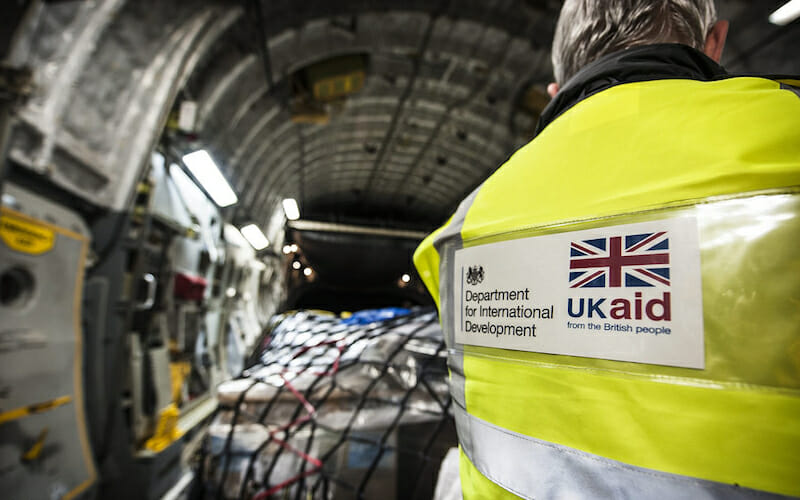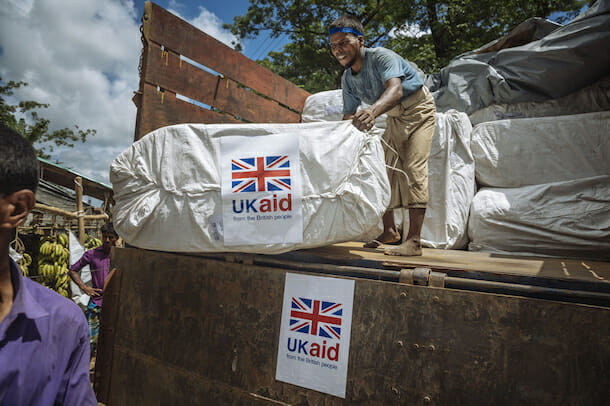
Britain’s Counter-Productive and Wasteful Foreign Aid
On 5 April 2018, the British government released data showing that its foreign aid budget has more than doubled since 2008, more than quadrupled since 2002. It rose during the supposedly austere Conservative government of David Cameron (2010-2016), who pledged to spend 0.7 percent of national income. The government has met that target every year since 2013, and spent £2.2 million above target in 2016.
Foreign aid spending has risen under the Conservative government of Theresa May, who was Home Secretary throughout Cameron’s premiership, overseeing cuts to policing budgets (of £2 billion over five years) that are now clearly linked to surges in crime generally, violent crimes in particular (which practically doubled in the same period). Foreign aid spending rose by £555 million to £13.9 billion in 2017. Foreign aid spending crosses departments, not just the Department for International Aid (DfID), such that the Department of Health spent £101 million in 2017, while crying for more funds at home lest emergency services collapse.
As you would expect, once a government is obliged to spend a certain proportion of its revenues, it spends inefficiently and unaccountably. In 2016, The Daily Mail newspaper’s reporting persuaded the government to cancel a project worth £5.2 million to fund a talk show by a pop group in Ethiopia. India receives money every year (in 2017, £54.2 million), even though India sends more to other nations as aid, has its own space program, and breeds more billionaires than Britain.
This misdirected spending arises from toleration for the pleasing platitudes and poor science around international aid and development generally. Take the widely peddled assumption that foreign aid helps foreign development, then think of most African states in the same politically-caused under-development they’ve always been, despite receiving most foreign aid.
Now take the assumption that foreign aid makes the world safer. In fact, little of Britain’s foreign aid is even directed against conflict. Britain’s Conflict, Stability, and Security Fund rose to £557 million in 2017 – but just 4 percent of foreign aid spending, and we cannot be confident that this is effective. In March 2018, the Independent Commission for Aid Impact concluded that it lacked proper checks on effectiveness. Most of the spending goes on training foreign soldiers and police, perhaps in respect for human rights, but ultimately these personnel are dual-use – useful for both legitimate campaigns against terrorism and illegitimate campaigns against political dissidents. Some of the funding for Palestinian authorities has been misdirected as incomes for convicted terrorists and as funding for educating children in extremist hate towards Israel and the West.
Then the aid-supporters counter that all development is stabilizing. In fact, liberal democratic development is stabilizing, but technically complex and multi-generational, but aiders are obliged to spend annually on third-parties quicker than they can learn for themselves. They are vulnerable to simple myths, such as that poverty “causes” conflict. In fact, poverty and conflict correlate as effects of other causes, such as government corruption. Yet foreign aid, by being channelled to poor countries, enables corrupt governments. Aiders rarely deliver their aid directly to the neediest: instead, they must negotiate all the bad actors first: a corrupt central government, the insurgents, terrorists, and militia, the middlemen, the tribal elders or village elders. A tiny fraction of aid actually reaches its intended targets.

Ironically, the aiders are often complicit in the corruption and obfuscation. Consider estimates that the Islamic State took some proportion of around $200 million sent to Syria as aid in 2014 alone. We don’t know the proportion, because the aiders themselves did not properly account for it. In 2018, we received rare reporting on an old problem: al-Shabaab – a Somali terrorist/insurgent group allied to the Islamic State – earns tens of thousands of dollars per day as taxes, tolls, and protection money for aid that is landed on the coast outside al-Shabaab’s control, but trucked within al-Shabaab’s control. Those earnings exclude the earnings made by middlemen, who sell the aid (that’s right, sell “aid”) to internally displaced persons, who pay with cash cards issued by the UN.
This isn’t just a UN mistake – it’s a problem that is inherent whenever aiders focus on getting aid to the needy without securing the needy from the bad actors first. This can happen even when the needy are military personnel fighting the bad actors. For instance, the US government found that at least 10 percent of the value of its contracts for logistics in support of US forces in Afghanistan were paid to the same insurgents or militia that US forces were fighting.
Humanitarian aid is often just hidden military aid. In March 2018, the United Nations quietly started to expand its inspections of ships bringing so-called humanitarian aid into Yemen’s ports, which are vehicles for armaments. Without them, the civil war in this impoverished state wouldn’t be in its fourth year, with sophisticated anti-ship missiles that have attacked warships from the United States and United Arab Emirates, anti-aircraft missiles that could bring down airliners, and ballistic missiles that have been fired at Saudi Arabia’s capital. The UN imposed the arms embargo back in April 2015. No doubt Yemen is suffering a humanitarian catastrophe – the UN estimates at least 22 million people there need assistance, but feeding mostly the bad actors only makes the plight of the victims worse.
The aiders’ complicity is sometimes darker than even bribery and dishonesty. From 2008 to 2017, UN employees on field operations committed 60,000 rapes, of which some tens of thousands were pedophilic, according to the former chief operations officer of the UN Emergency Coordination Center. In February 2018, some of Oxfam’s aid mission leaders were exposed for prostitution in Haiti since 2011. Around 2005, at least one of them had been reported for using charitable resources on prostitutes in Liberia; he was reported by a colleague to both Oxfam and UK DfID, both of which continued to employ him. Now we know that Oxfam wasted money on manicurists and public media for “celebrity ambassadors” and luxury apartments and cars in disaster areas, including Haiti. More recently, local deliverers of aid in Syria traded aid for sex, while aiders turn a blind eye.
These embarrassments have arisen in a culture of reification of aid. The whole aid fashion is back to front: aid before conflict resolution and political capacity-building. That order is counter-productive. The correct order is: resolve the conflict and political incapacity first, or secure the needy without the bad actors, then aid the needy. Aiders always claim that they are doing both, but inevitably in trying to do both they cut corners and go through the bad actors to get to the good.
Clearly, the British government’s priorities are distorted. It continues this distortion because vested interests within government, its contractors, a consensus of political parties, and a significant proportion of the electorate casually imagine that throwing foreign aid around must be doing good. These vested interests are in denial. The longer the government acquiesces in this denial, the more it will suffer once denial transitions to acceptance. In February 2018, the Daily Express newspaper submitted to the prime minister 100,000 postal coupons from its readers in opposition to the 0.7 percent rule. The newspapers and politicians that are aligned against the rule tend to be critics of Theresa May already, so she is unwilling to concede in the short-term, but she is making everything worse for herself in the long-term. The rule will be overthrown – the only question is: how much more.money, time, and lives will be wasted first?
